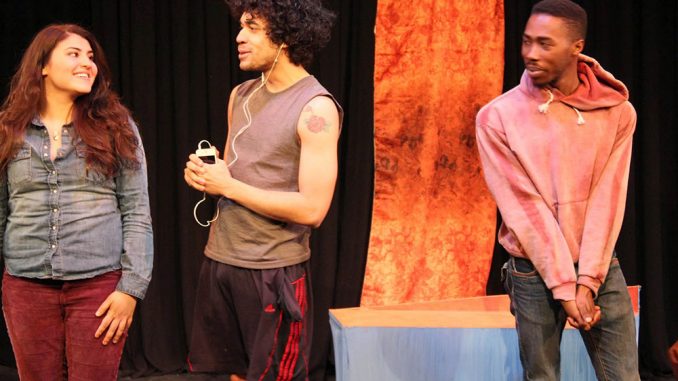

Pairs of eyes stared back at the audience for no more than 20 minutes at a time.
Their voices were sometimes shrill, sometimes pleading, laughing, grieving or daydreaming. But regardless of their action, their eyes took refuge in the silent audience members and told the stories of 18 high school students.
Six professional actors rotated on and off the bare stage, each performing monologues written by high school students as part of the 2014 Young Voices Monologue Festival, hosted collaboratively by Philadelphia Young Playwrights and InterAct Theatre Company at the Adrienne Theatre’s Playground.
The 10-day festival boasted four public performances and 11 student matinees, which ended March 29. The festival began 20 years ago when Philadelphia Young Playwrights and InterAct Theatre first collaborated.
The process started in fall when high school students were introduced to monologue writing through workshops and demonstrations at their high schools from all across the region. After the demonstrations, the students were invited to write monologues and submit them to be a part of the festival. Out of about 400 monologues submitted, 18 were chosen.
Mindy Early, director of education and program services with Philadelphia Young Playwrights, said the students started working with a director and dramaturge in early February, who quickly became their mentors and support systems throughout the process.
“In this program, these writers have a support network and multiple people saying, ‘We are here for you and your words and your work. We think you are important. We believe in you and your voice,’” Early said.
One of the goals of the program was to give the students confidence in both their writing and their voices.
“I think something clicks where they realize, ‘I am impactful, I have something to say to the world, it will listen and the world will respond and I can start a dialogue in my community,’” Early said.
High school junior and one of the 18 monologue winners, Angela Bey of Friends Select School, said the process of revision was a new experience for her in her own writing.
“I’m more confident in drafting my work now,” Bey said. “Typically, when I write a piece, I’m really defensive about people critiquing my work. But it’s not a bad thing to redo your work or look over your pieces. Now I’ll know exactly how to approach the process and I’ll welcome it in the future.”
For most of the professional actors responsible for conveying the vision of the students, the artistic setting of the program was unique.
“We either look for actors who are comfortable working with students, because it is a very collaborative process with students, or we look for actors involved with new play development,” Early said. “It’s a very different experience to work with a young playwright. It takes a different vocabulary and analytical skill and an ability to communicate with a writer who is actually in the room with you.”
Tasha Milkman, an actress in the festival and a past teaching artist apprentice, said the experience posed new challenges that aren’t always present for professional performers.
“The writing was so personal to some students, so I felt a bigger responsibility to do it justice,” she said. “When the actor is sitting in the front row of the audience, you really want to make it as best as it can be.”

Bey said she almost didn’t submit her monologue, “Pedestals,” because of how personal the writing is to her life.
“The biggest thing I was afraid of was having people not understand it,” Bey said. “But my director and dramaturge both related to the piece in such a way that was unbelievable for me. It was great having them because they could relate in their own personal experiences to my work.”
The high school students were not present for all of the shows, but they were able to walk through rehearsals with the actors once a week until the show was ready for performances.
“We want them to know that if the actor is interpreting things far from what they want, the student knows and feels empowered to be a part of the dialogue and process of revision,” Early said.
For Bey, the experience went beyond just drafting a monologue and working with professionals.
“They really encouraged you to look at your piece,” Bey said. “It speaks to how much they believe in your talent, your potential as an artist and your writing.”
Emily Rolen can be reached at emily.rolen@temple.edu.


Be the first to comment